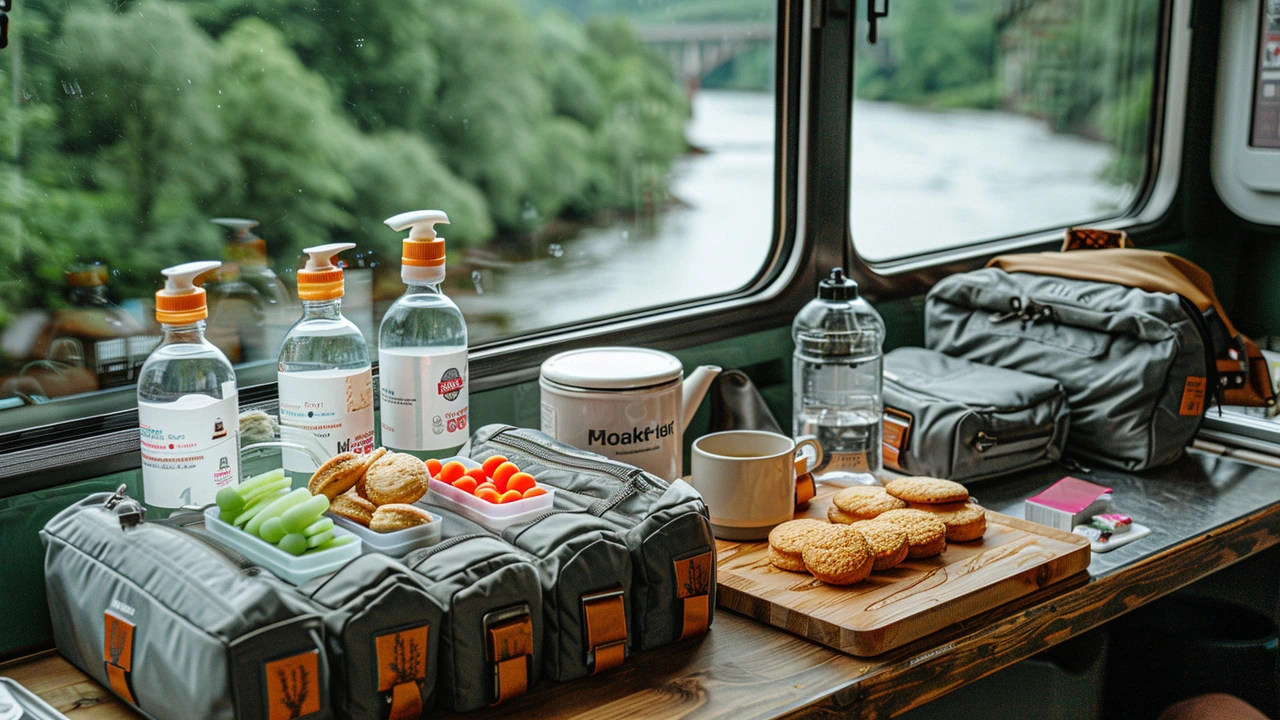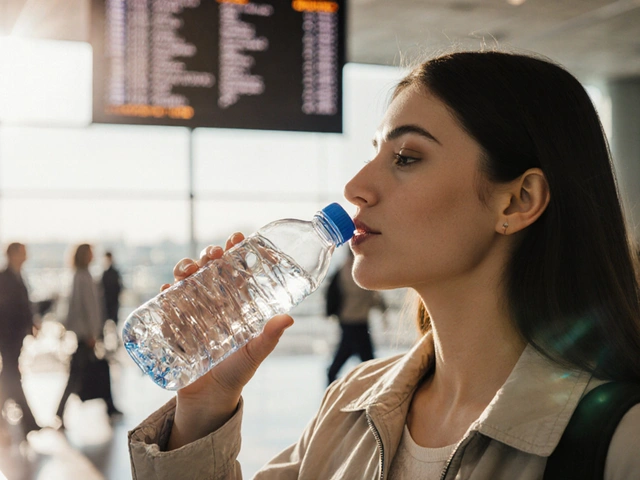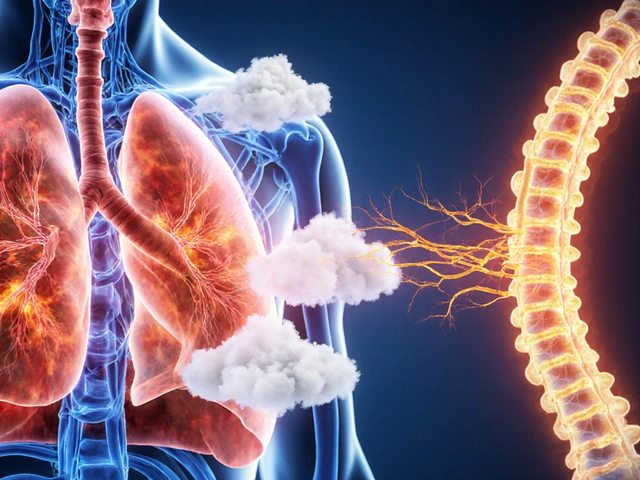Traveling can be an incredible adventure, but dealing with nausea can really put a damper on the experience. For those prone to motion sickness, long journeys by car, plane, or boat often come with a side of queasiness. Luckily, there are several ways to manage and reduce nausea, ensuring your travels are enjoyable and comfortable.
Let's explore some common causes, how your diet and hydration play a role, preventive steps you can take, and remedies you can use while on the go. By understanding and addressing these factors, you can keep nausea at bay and focus on making the most of your trip.
Understanding the Causes
Motion sickness, often manifesting as nausea, can make traveling an unpleasant experience. But why does it happen? At its core, motion sickness results from a conflict between the different senses that detect motion: your inner ear, eyes, and sensory nerves. When these systems send mixed signals to your brain, nausea can kick in.
Think about it—when you're reading a book in a moving car, your inner ear detects movement, but your eyes are focused on a stationary object. This sensory mismatch confuses your brain, leading to disorientation and uneasiness. This sense conflict is particularly common in vehicles like cars, boats, planes, and even amusement park rides.
How Your Brain Processes Motion
This conflict in sensory information creates a stir in the vestibular system, which is responsible for your sense of balance. The inner ear contains structures that determine motion and position. When your vestibular system detects movement but your eyes see a static scene, the brain struggles to process these contradictory messages, causing dizziness or vomiting.
Some individuals are more prone to motion sickness than others due to genetic and physiological factors. For instance, children aged 2 to 12 and women, especially pregnant women, are more susceptible. Researchers have also found that people who frequently get migraines are likely to experience heightened motion sickness.
"Motion sickness happens when the inner ear, the eyes, and deeper body parts send conflicting messages to the nervous system. When your eyes can't see the motion your body feels, nausea sets in." – Dr. Timothy Hain, Northwestern University.
Environmental Triggers
Environmental factors also play a big role. Strong odors such as those from perfumes, gasoline, or food can trigger nausea. Likewise, poor air circulation and extreme temperatures can heighten discomfort. Even factors like lack of sleep and high levels of stress can make the body more susceptible to feeling nauseous.
Psychological Aspects
Interestingly, anxiety about travel can lead to or exacerbate motion sickness, creating a vicious cycle. If you've experienced bad nausea in the past, the mere thought of traveling can set your nerves on edge, making your symptoms even worse. Preparing mentally and physically can go a long way in managing these psychological aspects.
Understanding these underlying causes is the first step in preventing and managing nausea while traveling. Whether it's through finding ways to synchronize your sensory inputs or addressing environmental factors, there are practical measures you can take to make your journey more comfortable. In the next sections, we'll delve into effective tips that can help keep nausea at bay during your travels.
Diet and Hydration
What you eat and drink can play a huge role in managing nausea while traveling. Certain foods and beverages can either alleviate or aggravate your symptoms. Knowing which ones to choose can make your journey much smoother.
First and foremost, it's crucial to stay hydrated. Dehydration is a common trigger for nausea, so drinking enough water is key. Aim for regular sips rather than chugging down large amounts at once, as this can sometimes upset your stomach. Avoid alcohol and caffeine, as they are diuretics and can lead to dehydration.
Light, bland foods are your best friends when dealing with travel-induced nausea. Crackers, toast, and rice can settle your stomach without causing further discomfort. It's best to avoid greasy, spicy, or heavy foods as they can make nausea worse. Foods rich in protein, such as lean meats and legumes, can also help stabilize your blood sugar levels and keep nausea at bay.
Ginger is a well-known remedy for nausea. It has been used for centuries to treat upset stomachs. You can find ginger in many forms—ginger tea, ginger candies, or even fresh ginger slices. According to a study published in the Journal of Pain and Symptom Management, ginger is effective in reducing nausea and vomiting in patients undergoing chemotherapy.
Citrus fruits like oranges and lemons can also be beneficial. They are not only refreshing but their scent can reduce feelings of nausea. You can carry a lemon with you and sniff it whenever you feel queasy, or have some citrus-flavored candies on hand.
If you're on a long journey, it's essential to eat small, frequent meals rather than a few large ones. This prevents your stomach from becoming too full and reduces the risk of nausea. Opt for healthy snacks like nuts, yogurt, and bananas. These are easy to pack and provide steady energy and nutrients.
For some, carbonated drinks like sparkling water can help settle the stomach, but it's best to avoid sugary sodas. The carbonation can reduce the feeling of nausea, but the sugar content might have the opposite effect.
"Staying hydrated with water, especially in small sips throughout the day, is one of the simplest yet most effective ways to combat travel-related nausea," advises Dr. Elizabeth Blount, a specialist in travel health.
Lastly, take note of any personal triggers. Some people find certain foods or drinks exacerbate their symptoms, while others find specific items help. Keeping a travel journal to track what works and what doesn't can be useful for future trips.
Preventive Measures
Preventing nausea while traveling often starts before you even step out the door. One of the first steps is to carefully plan your trip. Try to choose the smoothest mode of transportation available. For example, opting for a larger plane or a train can often lead to a smoother ride compared to a small car or a bumpy bus. If you are driving, consider taking routes with fewer twists and turns.
Seat selection can also play a huge role in minimizing nausea. When flying, try to book a seat over the wing, as this area typically experiences less turbulence. On a cruise, cabins located in the middle of the ship and closer to the waterline are more stable. In a car, the front seat receives fewer bumps, and passengers usually have a better view of the horizon.
Avoiding heavy, greasy, or spicy foods before traveling is another effective measure. These types of food can upset your stomach and make nausea worse. Instead, opt for a light meal with easily digestible foods. Additionally, keep hydrated but avoid excessive consumption of alcohol or caffeine, as they can dehydrate you and mess with your equilibrium.
Managing your sensory input can help prevent nausea. Keeping your eyes on the horizon or a stable object is a common technique. Motion sickness often occurs when your inner ear senses motion, but your eyes do not confirm the movement, so aligning these senses helps. Some people find it helpful to wear acupressure bands on their wrists, which apply pressure to a point that controls nausea.
Ventilation is key; fresh air can do wonders to make you feel more comfortable. If you’re in a car, open a window to let in fresh air. On a plane, use the personal air vents to keep air circulating. Scented items like peppermint oil or eucalyptus can refresh you and prevent queasiness.
Keeping yourself distracted is another great preventive measure. Listening to music, audiobooks, or engaging in light conversation can divert your mind from the feeling of nausea. Steer clear of activities that require you to look down, like reading. Instead, focus on the view outside or close your eyes and rest.
It can be helpful to adjust your posture. Sitting upright allows for better blood circulation and helps your body manage balance and equilibrium better. Slouching or lying down inappropriately can worsen the sensation of nausea.
According to Dr. Charles Parry, a well-respected travel physician, “Preparation is key to preventing motion sickness. Being mindful of factors like what you eat, your seat choice, and staying hydrated can significantly decrease discomfort.”
Ultimately, taking these preventive measures seriously can increase your chances of having a nausea-free journey. Each individual may respond differently to various techniques, so it might be a good idea to try a combination of these measures to find out what works best for you. When properly prepared, you can focus on enjoying your travel rather than worrying about potential discomfort.
Remedies During Travel
Sometimes, despite careful planning and preventive measures, nausea may strike unexpectedly during your journey. If this happens, having a toolkit of effective remedies can make a significant difference. These remedies range from natural approaches to over-the-counter medications, ensuring that you have several options to find what works best for you.
Start by considering some natural remedies. Ginger is renowned for its anti-nausea properties and can be consumed in various forms, such as ginger tea, ginger candies, or even raw ginger. The root’s compounds help to settle the stomach and reduce feelings of nausea. Another natural remedy to consider is peppermint; peppermint tea or peppermint essential oil can soothe an upset stomach.
Acupressure is another technique that can be highly effective. Pressing on the P6 (Nei-Kuan) point, located on the inner wrist about three finger-widths below the base of the palm, can alleviate nausea. Wristbands designed to apply pressure to this point are available and can be worn throughout your trip.
Sometimes, distraction can also help. Engaging in activities such as listening to music, watching a movie, or reading can take your mind off your discomfort. Aromatherapy with essential oils like lavender or lemon can also provide comfort. Smell is a powerful sense and certain scents can be calming and reduce the sensation of nausea.








